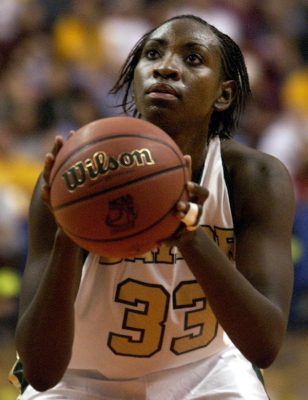The Faith & Sports Institute (FSI) at Baylor University’s Truett Seminary was publicly launched in 2021. It’s a place where Christian leaders in sports are formed and equipped through theological education, compelling research and practical training.
 One of FSI’s supporters is Sophia Young-Malcolm. An All-American at Baylor and an All-Star in the WNBA, Young-Malcolm is currently the Assistant Athletic Director for Player Development with the Baylor women’s basketball team. FSI sat down with Sophia to discuss her sports and faith journey and the potential she sees in FSI.
One of FSI’s supporters is Sophia Young-Malcolm. An All-American at Baylor and an All-Star in the WNBA, Young-Malcolm is currently the Assistant Athletic Director for Player Development with the Baylor women’s basketball team. FSI sat down with Sophia to discuss her sports and faith journey and the potential she sees in FSI.
Talk us through your sports experience and your current role. How did you come to Baylor as an athlete and then end up back here on staff?
I grew up in the Caribbean, and my mom always told us that we needed to be good at two things: sports and school. So I grew up with that mentality. When I was 15 I came to the U.S. as part of a foreign-exchange program. I went to Shreveport, Louisiana, and spent three years of high school there and started playing basketball. That’s how I was able to get a full scholarship to Baylor.
After college I got drafted by the San Antonio Stars and played for nine seasons. When I retired I got married, had two babies and coached at a high school in San Antonio before coming back to Baylor as Assistant AD of Player Development.
Now I get to work with our athletes to try to get them prepared for life when all of the glamour and glitz of sports is over.
What excites you about your work?
One of my favorite things is helping guide our athletes when they go through a tough loss. Basketball is so emotional. You can go through so many ups and downs. It’s all about how you handle those moments.
A lot of my role is checking in with our girls, being someone they can talk to and be honest with. Whatever emotion they’re going through, I can listen and provide them with some sort of encouragement. I can say to them, “I’m speaking to you from experience, because I was in your shoes in this same locker room.” I can also remind them, “Hey, there’s more to life than this moment.”

Sophia Young while playing for Baylor in 2005. (AP Photo/Charles Rex Arbogast)
There are so many challenges athletes face these days. What issues have you noticed and how do you think the Christian faith speaks to those concerns?
The issues can range from a simple challenge like “how can I get more playing time?” to something more serious like “my mental health is really an issue.” There’s a spectrum. Another major issue is just feeling wanted or appreciated. Athletes need to feel valued as a person, for who they are, and not just for their performance.
One of the reasons I came back to Baylor is because we can say the name of Jesus loud and proud; we can be open about our Christian faith. And I think when we’re really living out our faith, we’re stressing that the athlete is more than their performance. They are a person created by God who is yearning and searching for more.
The Christian faith helps put things in perspective, too. Everyone’s playing career is going to come to an end someday, and so I try to give players the knowledge and insight that there’s so much more to them than what they do on the court.
You’ve pursued multiple graduate degrees, you teach and lead others, and at the same time you continue to learn and grow. Why do you think the desire to keep growing is so important for leaders?
I remember, as an athlete, I wanted to be the best that I could be. I wanted to get better. So I had to put in work. My desire to grow, especially in my knowledge of Christ, is similar. I want to get better. I want to know what I’m talking about. And we can’t just sit down and expect knowledge to come right to us. We have to go out and seek it.
Especially in the times we live in, with so many issues we’re asked to address, we have to know what we’re talking about. The only way to do that is to learn.
You’re part of the Advisory Council with the Faith & Sports Institute. Can you tell us what interests and excites you about FSI’s work?
I love how FSI is trying to get coaches and other sports leaders to understand the impact that they can have on the people they serve. If we don’t know the impact that we have or if we don’t know what we’re talking about — not just in sports, but in life — then we will send players down the wrong path.
Not everything is about performance, right? I think we can get in that mindset where a player’s value is only there as long as they can help the coach win. But if we continue to equip sports leaders through the resources and courses that FSI offers, I think we can make sports a better experience and have a tremendous impact on the generations of young athletes to come.
What has God been teaching you recently?
Every year I come up with a word or a phrase, something to keep me centered and in line with God. This year I have two things. One is the phrase “tunnel vision.” I feel that whenever our focus is on God, everything else will eventually come into alignment.
And my other word for the year is “serve.” I feel like God is really pushing and pulling me in this. How am I serving right here where I’m planted? What am I truly doing for the athletes I’m with? Even if it means that I’m not in the spotlight or even acknowledged for the little things that I do, God sees it.
I’m just trying to get that mentality that this is about the Kingdom of God. Not what man sees but what God sees.
***
If you are interested in learning and growing with the Faith & Sports Institute, visit our website to learn more about our online and residential graduate programs, our online certificate program and more.
— Paul Putz
Faith & Sports Institute, George W. Truett Theological Seminary, Baylor University
RELATED STORIES:
— Baylor sports chaplain John Maurer transforms student-athletes through ministry
— At Baylor’s Truett Seminary, A Center for Christian Sports Leaders
— Christians in Sports Should Consider Theological Education, NFL Coach Explains Why



